- Home
- Alex Archer
The Vanishing Tribe
The Vanishing Tribe Read online
A lost city. A missing tribe. And treasure beyond imagining...
When archaeologist Annja Creed attends an auction in Botswana featuring personal effects of an infamous explorer, she purchases a small and seemingly unremarkable piece of art. It’s not until the explorer’s son makes a desperate attempt to steal it that Annja uncovers the secret of the painting…or rather, the secret map behind the painting.
The map points to the Lost City of the San tribe, bushmen who had long ago disappeared off the face of the planet and whose city—so legend has it—was once littered with diamonds. But is the map an epic archaeological discovery or a fantastic work of fiction? Compelled to find out, Annja must face not only the perils of the African bush, but a treacherous son determined to take back his father’s greatest legacy…no matter what the cost.
Annja looked Bryant in the eye and said, “I’m going to kill you.”
Bryant was obviously taken aback. “You’re welcome to try,” he said after a moment, laughing it off.
Jones scowled at the other man and then turned his attention back to her. “Dr. Crane told us about the clues my father left to the location of the Lost City. Be a good girl and turn them over now, why don’t you?”
Annja stared at him without saying another word.
“Uncooperative to the end. I expected no less,” Jones said with a smile. “So be it.” He extended a hand toward Bryant, who was already in the process of passing him something.
Realizing what it was, Annja charged—but she was far too late. She made it three steps before the dart took her high in the chest, near her neck.
She managed another step before darkness closed in and she crashed to the ground.
Titles in this series:
Destiny
Solomon’s Jar
The Spider Stone
The Chosen
Forbidden City
The Lost Scrolls
God of Thunder
Secret of the Slaves
Warrior Spirit
Serpent’s Kiss
Provenance
The Soul Stealer
Gabriel’s Horn
The Golden Elephant
Swordsman’s Legacy
Polar Quest
Eternal Journey
Sacrifice
Seeker’s Curse
Footprints
Paradox
The Spirit Banner
Sacred Ground
The Bone Conjurer
Tribal Ways
The Dragon’s Mark
Phantom Prospect
Restless Soul
False Horizon
The Other Crowd
Tear of the Gods
The Oracle’s Message
Cradle of Solitude
Labyrinth
Fury’s Goddess
Magic Lantern
Library of Gold
The Matador’s Crown
City of Swords
The Third Caliph
Staff of Judea
The Vanishing Tribe
ROGUE ANGEL
ALEX ARCHER
The Vanishing Tribe
Special thanks and acknowledgment to
Joe Nassise for his contribution to this work.
The Legend
...The English commander took Joan’s Sword and raised it high.
The broadsword, plain and unadorned, gleamed in the firelight. He put the tip against the ground and his foot at the center of the blade. The broadsword shattered, fragments falling into the mud. The crowd surged forward, peasant and soldier, and snatched the shards from the tramplued mud. The commander tossed the hilt deep into the crowd.
Smoke almost obscured Joan, but she continued praying till the end, until finally the flames climbed her body and she sagged against the restraints.
Joan of Arc died that fateful day in France, but her legend and sword are reborn...
Contents
Prologue
Chapter 1
Chapter 2
Chapter 3
Chapter 4
Chapter 5
Chapter 6
Chapter 7
Chapter 8
Chapter 9
Chapter 10
Chapter 11
Chapter 12
Chapter 13
Chapter 14
Chapter 15
Chapter 16
Chapter 17
Chapter 18
Chapter 19
Chapter 20
Chapter 21
Chapter 22
Chapter 23
Chapter 24
Chapter 25
Chapter 26
Chapter 27
Chapter 28
Chapter 29
Chapter 30
Chapter 31
Chapter 32
Chapter 33
Chapter 34
Chapter 35
Chapter 36
Chapter 37
Chapter 38
Chapter 39
Chapter 40
Chapter 41
Chapter 42
Chapter 43
Chapter 44
Chapter 45
Chapter 46
Prologue
Humphrey stumbled forward.
It took everything he had to put one foot in front of the other, but he persisted despite the immense effort it required, knowing that if he did not, if he stopped and let himself rest, the likelihood of getting up again was practically nonexistent.
The knife wound in his shoulder had become infected two days ago. Or was it three? He was no longer certain. The days began to blur together as the pain spread and his fever grew. To make matters worse, he couldn’t trust his ability to recognize the passage of time. Twice now he’d come to his senses to find himself stumbling through unfamiliar territory, his body powering him onward while his brain had been on hiatus. He had no way of knowing how long he’d been disoriented. He’d left his watch back in camp when he’d run for his life.
Not that he could have focused on his watch; his vision was growing progressively more blurry as the afternoon wore on. Possibly the glancing blow he’d taken to the side of the head during his escape hadn’t been that glancing, after all. He was too experienced an explorer to ignore the possibility of concussion. The infection in his arm would greatly reduce his chances of survival. Adding a concussion on top of that and he might as well pronounce himself dead on the spot, regardless of whether or not he was still breathing.
The expedition had started out well enough. The map had been a godsend; Farini had laid out the steps they were to follow with a surveyor’s precision, and Humphrey had taken his team from one waypoint to the next with minimal difficulty. Each time they’d located another of Farini’s landmarks, Humphrey had grown more convinced they would find the Lost City of the Kalahari. Just as Farini and his son had done nearly a century earlier.
Everything had been progressing just as planned. That was, until Barnes shot the San tribesman.
The mean-hearted bastard claimed it was an accident. But Humphrey had overheard talk of “bagging a trophy,” as if the natives of the Kalahari, a society that had existed for thousands of years practically untouched by modern influences, were no better than the wildlife around them.
Clearly Barnes hadn’t anticipated just how fiercely the tribe would react.
They had awoken the morning after the San’s death to find the tires on all their vehicles slashed and all their gas tanks punctured and empty. A look under the vehicles’ hoods had revealed even more damage. While the destruction was bad enough, what frightened Humphrey was the fact that all this had been done while the men slept only a few feet away. Not one of them had heard the San.
Humphrey knew he had entirely lost control o
f the expedition at that point. His pleas to try to communicate with the tribesmen had been shouted down by the more militant members of his entourage and soon there had been a minicoup as he was supplanted in his role of expedition leader by none other than that idiot, Barnes.
Fool. He deserved everything he’d gotten as a result.
They’d tied Humphrey’s hands and lashed him to a nearby baobab tree to keep him from interfering as they’d settled into defensive positions around the camp, ready for the tribesmen should they return.
Stumbling along, Humphrey shook his head at the memory. The San had come with a vengeance and within moments of their arrival the entire camp had been engulfed in chaos. He knew he would never forget the sight of the San leader on a massive bull elephant as it reared over Barnes, ready to crush him with its forelegs.
Humphrey had somehow managed to free himself from his bindings and fight his way out of the camp. The knife wound had come from one of his own men. The possible concussion was a gift from a San tribesman with a club made of elephant bone.
Humphrey had been on the run since.
The Kalahari Desert was not a forgiving place and even in his fevered state he knew that if he didn’t find help and shelter soon he wouldn’t live to see next week. Initially, he thought he could make his way back along the path to where they had encountered a group of Dutch naturalists, but that plan fell by the wayside once he lost track of where he was and what direction he was traveling in.
It took everything he had just to keep moving forward.
A full moon—when had it become night?—gave him just enough light to avoid the major obstacles in his path. Not that there were all that many; aside from the occasional baobab tree, the Kalahari was pretty much flat pans and scrubland. He used the moon as a guide, stumbling toward it to prevent himself from traveling in circles. It wasn’t the most effective compass bearing, but it was big and bright and easy to find in his fevered state, which was about as much as he could hope for.
At the incongruous sound of laughter to his right, Humphrey spun in that direction, nearly toppling to the ground. All he saw was the mottled brown back of an animal keeping pace with him.
Before he could begin to panic, he heard the laughter again, this time to his left. A similar animal was tracking him on that side, as well.
Fear pooled in his belly.
Hyenas.
In that moment Humphrey knew he was going to die here.
He’d been in Africa long enough to recognize the laughter for what it was, a hyena call to alert the clan of a food source.
In minutes he would be surrounded. Contrary to popular belief, hyenas were not cowardly or timid animals. In fact, they could be both bold and dangerous. They were no doubt sizing him up, smelling his blood, sensing his sickness, and it wouldn’t be long before one of them grew daring enough to try to take a bite.
He couldn’t outrun them. His only hope was to find a place where he could hole up away from them and wait for the clan to grow bored and wander away.
In other words, he needed a miracle.
Humphrey staggered on, lost in delirium, and when he came to his senses next his two hyena companions had grown to a pack of six or more. They moved through the scrub on all sides of him, their yipping and howling letting everything within a half mile know that he was their prey and to keep back.
Tears began to course down his cheeks, matching the blood now running down his arm as his exertion reopened his shoulder wound. One foot in front of the other. One foot in front of the other.
The lead hyena, a big female that had to weigh a good one hundred and twenty pounds, dashed toward him from the side. He turned to face her, waving his arms and screaming, and she broke off her charge, disappearing into the darkness.
The attacks would become more frequent now, more aggressive.
He glanced around, searching desperately for something, anything, that could help him, when his gaze fell upon a large baobab tree about a hundred yards off to his left. He angled his path in that direction.
The hyenas swooped in twice along the way, the last time coming within just a few feet of him before turning aside. The next time Humphrey wouldn’t be so lucky. He wanted to shout for joy when he reached the massive trunk of the baobab tree. He couldn’t climb it—the nearest branches were thirty feet above his head—but with his back against it he would at least be safe from an attack from behind.
Humphrey had reached the end of his rope. His legs wouldn’t even hold him upright anymore; he slid to the ground, his feet splayed out before him. His hands fell on some of the hard baseball-size fruit scattered at the base of the tree and he snatched them up. They were a poor excuse for a weapon but they would have to do.
He got to test them out a few seconds later as the first of the hyenas made a cautious approach, sticking its head out of some nearby brush and baring its teeth at him. Summoning as much strength as he could, Humphrey threw one of the fruits at the hyena’s head.
Fate was with him. He struck the hyena’s nose, startling it enough that it retreated into the scrub. Unfortunately, the effort to throw with that kind of accuracy also drained him. He’d be able to manage the stunt once, maybe twice, more.
The hyenas, it seemed, weren’t going to give him the chance, though. Three of them advanced out of the brush, snarling and growling as they cautiously made their way forward. He tried shouting and yelling, but it did no good.
Without looking away from the advancing beasts, he felt around on the ground beside him until he found a good-size rock. He clutched it, determined to defend himself to the last.
The hyenas crept forward, their muzzles low to the ground, their lips pulled back.
Suddenly the lead hyena’s ears pointed forward. A moment passed and then the trio turned as one, dashing into the darkness.
Even in the depths of his fever, Humphrey knew their sudden departure wasn’t a good sign. Only a lion or some other large predator could make a pack of hyenas abandon an all-but-certain kill. The way they’d run off without even the slightest resistance told him that, whatever it was, it was much bigger and nastier than the hyenas.
He gripped his makeshift weapon tighter and prepared for the worst.
A minute passed.
Two.
Humphrey’s vision swam and his head began to sag toward his chest as darkness sought to drag him down. He shook it off for what felt like the hundredth time since escaping the camp, determined to meet his death when it came.
As his vision cleared he jerked back with a start.
A San tribesman was squatting a few feet in front of him, watching him with eyes as emotionless as slate. He wore nothing but a loincloth, the rest of his skin covered with some kind of muddy paste that would make it easy for him to blend into the background. In his left hand he held a spear, the butt of which rested on the ground, the tip pointing skyward.
Without a change of expression the San warrior raised his other hand to his mouth and blew through it.
Humphrey watched a cloud of dust burst from the man’s closed fist and before he could stop himself he’d breathed the powder into his lungs.
His throat closed up immediately.
He fought to take in another breath, but it was no use. The darkness closed in quickly, his view of the San warrior in front of him swiftly dwindling until all he could see was the man’s dark eyes.
Then the darkness claimed him entirely.
1
“Did you hear that?”
Annja glanced across the platform to where her cameraman, Lenny Davis, was seated. In the dim light he was hard to see—his dark skin and hair blended nearly perfectly with the night around them—but she knew where he was because they’d both been sitting in the same place for two weeks. Right now, though, the vibe he was giving off was very different from his usual laid-back attitude. Something clearly had him spooked.
“I didn’t hear anything,” she told him, which was the truth, though that was most likely beca
use she’d been daydreaming about getting out of this fetid swamp. After being here for this long, who could blame her?
The two were deep in the Jiundu swamp in northwestern Botswana, following up on a recent rash of bat men sightings and trying to catch some footage of the alleged creature. It was their latest assignment for Chasing History’s Monsters, the cable television show Annja cohosted. The show focused on exactly what its name indicated—historical madmen, psychopaths, serial killers and even legendary monsters—hence the reason they were on a platform ten feet off the ground using low-light cameras to try to catch a glimpse of what their producer, Doug Morrell, was calling the “scoop of the century.” Of course, he’d said the same thing about the past three assignments he’d sent them on. Including one where he’d had them trying to film the ghost of a man-eating great white shark off the coast of Indonesia, which was why Annja didn’t place much stock in his assessment. Investigating murderous ghosts was one thing; investigating the ghosts of murderous sharks was something else entirely.
Annja was five feet ten with chestnut hair beneath her favorite Yankees baseball cap. Dressed in a pale blue tank top, khaki shorts and hiking boots, she stretched her legs out in front of her, trying to keep from cramping.
“There it is again!” Lenny climbed to his feet, silhouetted in the dim moonlight. “Listen.”
This time, Annja did hear something. It was faint, hard to decipher over the typical night noises coming out of the swamp. Like the sound of...the flapping of large wings?
“I hear it,” she told him.
But what the heck was it?
She didn’t think for a moment that it was an actual bat man; she was expecting to find a perfectly natural explanation for the so-called sightings that had occurred over the past several months. An unusually large vulture, perhaps, or maybe some unknown species of bird, driven out of the deeper swamps by the recent rainy season. Either would make far more sense than the mysterious bat people Doug was convinced were hiding here.
She rose to her feet and tried to get a fix on the sound. It was getting louder, and therefore closer, but she couldn’t pin down which direction it was coming from. It seemed to bounce off the trees and water all around them. The quarter moon wasn’t much help, either; what little light it cast added more shadows than it illuminated.

 Rogue Angel: Forbidden City
Rogue Angel: Forbidden City The Spider Stone
The Spider Stone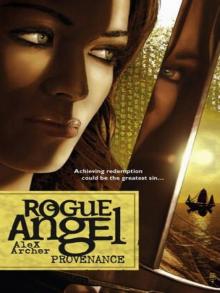 Provenance
Provenance Blood Cursed
Blood Cursed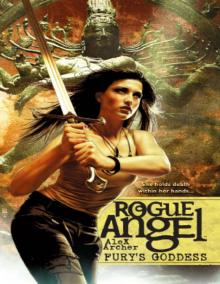 Fury's Goddess
Fury's Goddess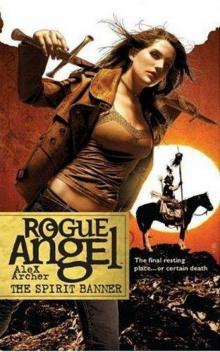 The Spirit Banner
The Spirit Banner Footprints
Footprints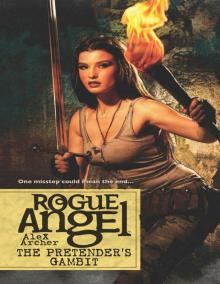 The Pretender's Gambit
The Pretender's Gambit Rogue Angel: The Lost Scrolls
Rogue Angel: The Lost Scrolls Staff of Judea
Staff of Judea Rogue Angel 55: Beneath Still Waters
Rogue Angel 55: Beneath Still Waters The Mortality Principle
The Mortality Principle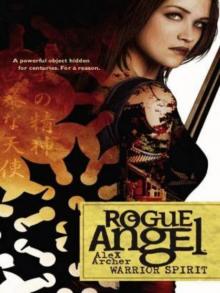 Warrior Spirit
Warrior Spirit Paradox
Paradox Tear of the Gods
Tear of the Gods Forbidden City
Forbidden City River of Nightmares (Rogue Angel)
River of Nightmares (Rogue Angel) Rogue Angel: The Secret of the Slaves
Rogue Angel: The Secret of the Slaves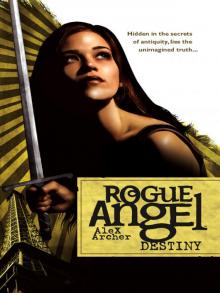 Destiny
Destiny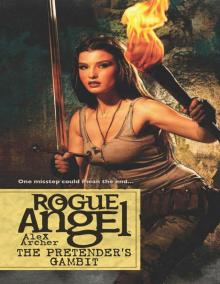 Rogue Angel 51: The Pretender's Gambit
Rogue Angel 51: The Pretender's Gambit Celtic Fire
Celtic Fire Rogue Angel 54: Day of Atonement
Rogue Angel 54: Day of Atonement Day of Atonement
Day of Atonement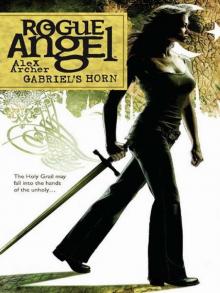 Rogue Angel: Gabriel's Horn
Rogue Angel: Gabriel's Horn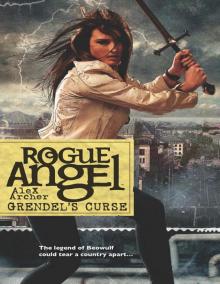 Grendel's Curse
Grendel's Curse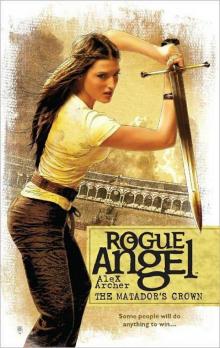 The Matador's Crown
The Matador's Crown Rogue Angel: The Chosen
Rogue Angel: The Chosen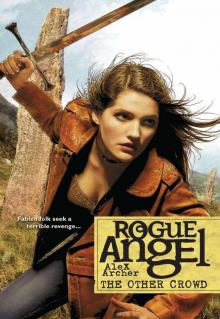 The Other Crowd
The Other Crowd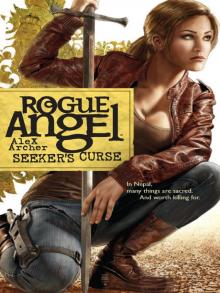 Seeker’s Curse
Seeker’s Curse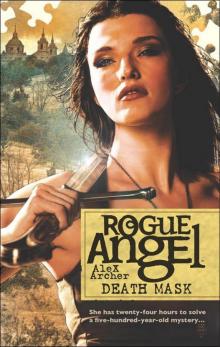 Rogue Angel 52: Death Mask
Rogue Angel 52: Death Mask The Golden Elephant
The Golden Elephant Blood Cursed (Rogue Angel)
Blood Cursed (Rogue Angel) Celtic Fire (Rogue Angel)
Celtic Fire (Rogue Angel)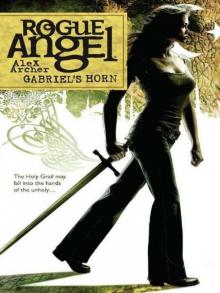 Gabriel's Horn
Gabriel's Horn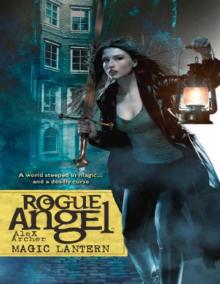 Magic Lantern (Rogue Angel)
Magic Lantern (Rogue Angel) God of Thunder
God of Thunder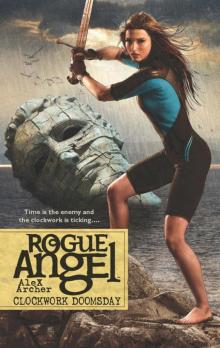 Clockwork Doomsday
Clockwork Doomsday The Bone Conjurer
The Bone Conjurer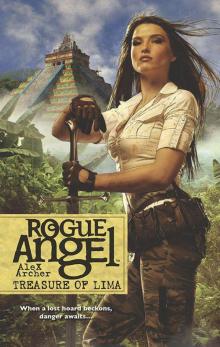 Treasure of Lima
Treasure of Lima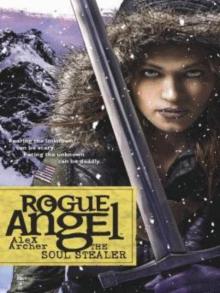 The Soul Stealer
The Soul Stealer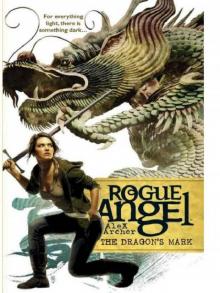 The Dragon’s Mark
The Dragon’s Mark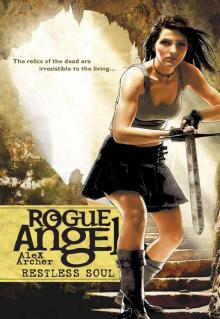 Restless Soul
Restless Soul Rogue Angel: God Of Thunder
Rogue Angel: God Of Thunder Rogue Angel 49: The Devil's Chord
Rogue Angel 49: The Devil's Chord Death Mask
Death Mask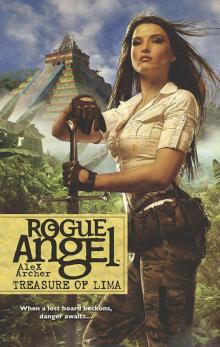 Rogue Angel 46: Treasure of Lima
Rogue Angel 46: Treasure of Lima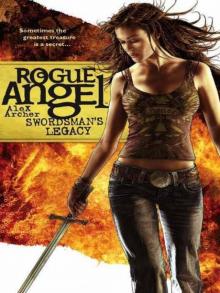 Swordsman's Legacy
Swordsman's Legacy The Oracle's Message
The Oracle's Message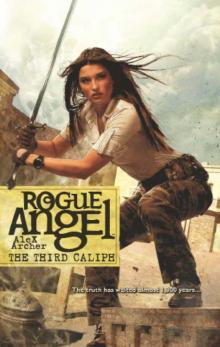 The Third Caliph
The Third Caliph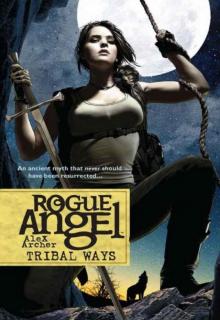 Tribal Ways
Tribal Ways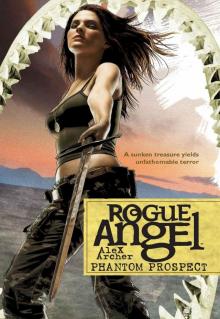 Phantom Prospect
Phantom Prospect Rogue Angel 50: Celtic Fire
Rogue Angel 50: Celtic Fire Library of Gold
Library of Gold Rogue Angel 53: Bathed in Blood
Rogue Angel 53: Bathed in Blood Sacred Ground
Sacred Ground The Devil's Chord
The Devil's Chord Serpent's Kiss
Serpent's Kiss The Vanishing Tribe
The Vanishing Tribe Sunken Pyramid
Sunken Pyramid Sunken Pyramid (Rogue Angel)
Sunken Pyramid (Rogue Angel)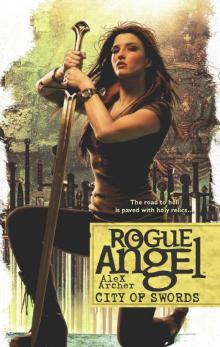 City of Swords
City of Swords Bathed in Blood
Bathed in Blood The Lost Scrolls
The Lost Scrolls The Babel Codex
The Babel Codex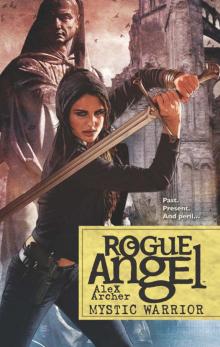 Mystic Warrior
Mystic Warrior Eternal Journey
Eternal Journey Beneath Still Waters
Beneath Still Waters Solomon's Jar
Solomon's Jar Beneath Still Waters (Rogue Angel Book 55)
Beneath Still Waters (Rogue Angel Book 55) Cradle of Solitude
Cradle of Solitude Secret of the Slaves
Secret of the Slaves River of Nightmares
River of Nightmares Polar Quest
Polar Quest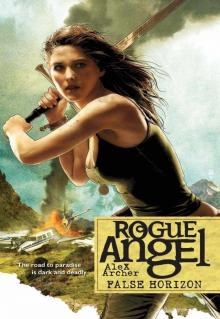 False Horizon
False Horizon